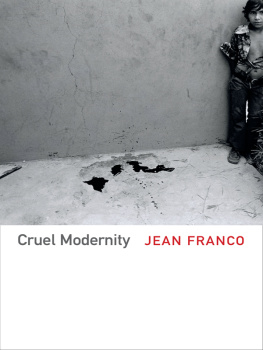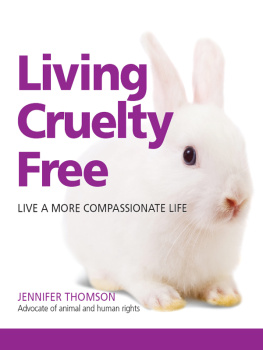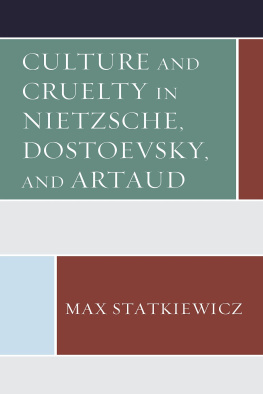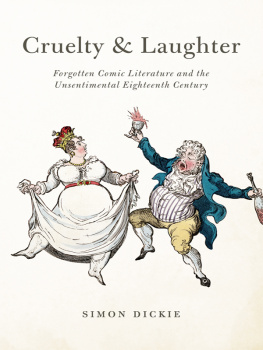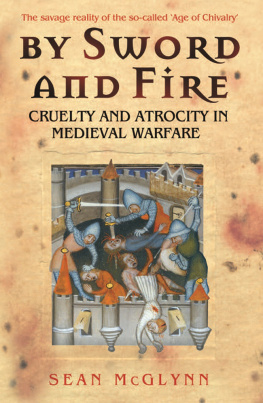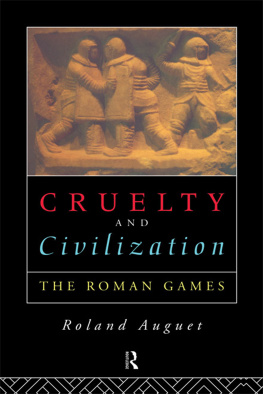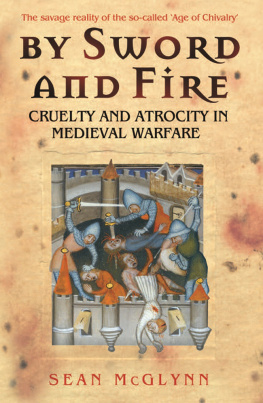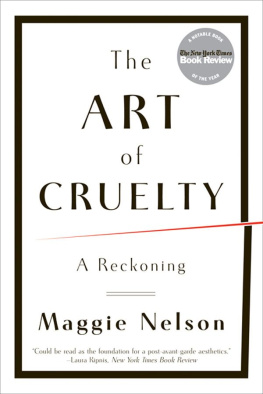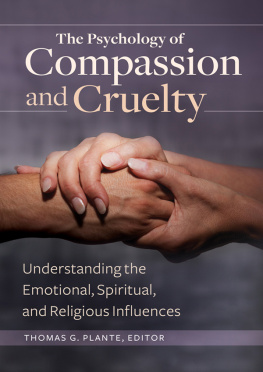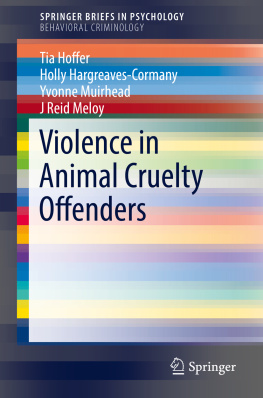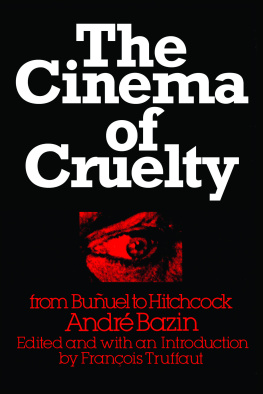If anything tests your ideas, it is teaching, which affords you the sounding board of colleagues and students. In retirement you have no such sounding board, and it was for this reason that I floated the idea for Cruel Modernity to a group of colleagues and friends at New York University, among them Sybille Fischer, Ana Dopico, Mary Louise Pratt, and Gabriela Nouzeilles, to all of whom I owe a debt of thanks. I thank Patrick Deere for his technical help that was so necessary given my deplorable Luddite approach to machines. I thank Ruth Formanek for her generous comments on photography, Diamela Eltit and Catalina Parra for their valuable suggestions on Chile, and Marta Lamas for supplying me with information on feminicide in Mexico. The book owes much to the work of Ileana Rodrguez and Mara Saldaa and to the support of Ed Cohen, who helped preserve my sanity. Thanks also to Christi Stanforth, the production editor, and to April Leidig, the designer and typesetter.
I owe a special debt of gratitude to Cristina Camille Prez Jimnez, who helped prepare the manuscript for publication, and to the Mellon Foundation for financial support toward the manuscript's completion.
INTRODUCTION
Cruelty, a word that suggests a deliberate intention to hurt and damage another, is not only practiced by governments, including democracies, that employ torture and atrocity for many different reasonsfrom the extraction of information, to the suppression of dissident and ethnically different groupsand by criminal groups, especially drug gangs that use mutilated bodies as warnings. It is now deeply embedded in fantasy life: in cartoon violence, in video games, in literature and visual art, in mass media versions of the Holocaust and the dirty wars. Consider a film like Quentin Tarantino's Inglourious Basterds, in which extreme cruelty is played for laughs as Jewish commandos in Nazi Germany rival the SS in horrendous acts and scalp their prisoners. Tarantino boasted that taboos are meant to be broken, but when the taboo against harming another is broken, there can be no limits, no social pact. Jonathan Littell's novel The Kindly Ones devotes several hundred pages to acts of cruelty as the protagonist, a Nazi officer, welcomes the reader as his brother, as someone who in the same circumstances would behave just as he did. Postapocalyptic devastation in countless films, in comics and in novels takes us back to primitive states where violence was the necessary tool of survival. Notorious crimes are rapidly fictionalized oradapted to the cinema. The young women murdered in Ciudad Jurez were scarcely cold in their graves before a feature film, Border Town, was released, with its sickening vulgarization of the murders. Holocaust films such as The Boy in the Striped Pajamas, The Pianist, and The Reader bring together enemiesthe Nazi and the Jew, the German officer who loves music and the Jewish musician, a former camp policewoman and an adolescent boyin a manufactured reconciliation. Neither cruelty nor the exploitation of cruelty is new, but the lifting of the taboo, the acceptance and justification of cruelty and the rationale for cruel acts, have become a feature of modernity.
Although Cruel Modernity focuses on Latin America, I do not intend to suggest that cruelty is uniquely exercised there; rather, I examine under what conditions it became the instrument of armies, governments, and rogue groups and how such conditions might be different in these cases than in the often-discussed European cases. Why, in Latin America, did the pressures of modernization and the lure of modernity lead states to kill? The anxiety over modernity defined and represented by North America and Europe all too often set governments on the fast track that bypassed the arduous paths of democratic decision making while marginalizing indigenous and black peoples. States of exception and states of siege not only justified the suppression of groups deemed subversive or alien to modernity but also created an environment in which cruelty was enabled in the name of state security. Although democratization has recently tempered some formerly authoritarian states, the flourishing drug trade has created zones where all manner of cruelty can be exercised with impunity. Writing of the murder of hundreds of women in Ciudad Jurez, Rita Laura Segato argues that here, as with the Holocaust, the historical conditions that transform us into monsters or accomplices of monsters lie in wait for us all [nos acechan a todos]. To this must be added another factor in Latin America, where the war on communism brought US advisers who remained aloof from the atrocities on the ground yet provided the justification, the weapons, and the training.
It took the atrocious death of millions during the First World War and the Holocaust to raise the problem of evil in relation to particular events. In 1915, confronting the fact that the Great War was as bloody as and more destructive than previous wars because weaponry had become The civilized cosmopolitan finds himself in disarray, for the war seems to have reversed human development. It is just as though, since we take a large number, even millions of people, all the moral acquisitions of individuals are obliterated, and only the most primitive, the oldest and most brutal psychical attitudes remain (182).
In 1932, in a letter to Einstein, Freud acknowledges that his work, like every science, is a kind of mythology and argues that there is no point in wishing to wipe away mankind's aggressive tendencies, although they can be diverted. He acknowledged that for a long time he had been reluctant to engage with this nonerotic aggression (79). Whereas the work of Eros binds humanity into a community, aggression threatens this bond, but in the best of cases it is checked by the superego, which watches over the individual like a garrison in a conquered city (84). Throughout his writing, Freud insists on community as an achievement and guilt as its instrument. The murder of the father in Totem and Taboo consolidates through their common guilt the band of brothers and, at the same time, founds the community on the basis of prohibition. But what happens when conscience does not repudiate cruelty, when the superego fails to kick in, and when the band of brothers feels no guilt but rather celebrates their bonding through some infamous act of sacrifice? After the Pinochet coup in Chile in 1973, the military and the police immediately set on unarmed men and women and executed hundreds of them, consolidating their own loyalty to each other and to the new regime.
For Derrida, it is the obscure word cruelty that concentrates all the equivocations. What does cruel mean? Do we have, did Freud have, a rigorous concept of the cruelty that, like Nietzsche, he spoke of so much

